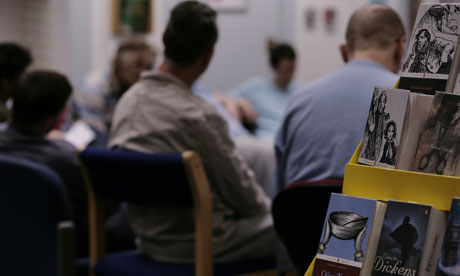
It's been reported that the prisoners being held in Guantánamo Bay's secretive Camp 7 are all raving about bestselling erotic romance Fifty Shades of Grey. "Rather than the Qur'an, the book that is requested most is Fifty Shades of Grey. They've read the entire series in English, but we were willing to translate it," the Huffington Post quoted US congressman Jim Moran as saying after a tour of the camp last week. "I guess there's not much going on, these guys are going nowhere, so what the hell." Excuse me for being more than just a tad sceptical.
One thing this titillating bit of underhand gossip does highlight is the importance of reading in prison. Prison life reduces and damages in so many ways – the spirit-crushing monotony of living the same day over and over in a hostile setting for months, years or decades can take a harsh toll on even the most determined mind. A good book can nourish, relax and energise an individual's mental capacity like little else.
One of the reasons I agreed to become a patron of The Reader Organisation, the charity that promotes and champions shared reading, was because of what I gained from my own prison reading experience.
Having entered prison barely literate, I credit reading – in isolation and in groups – with helping me to make some sense of who I was and guiding me towards becoming who I should have been. One TRO project currently underway is called RiSE – Reading in Secure Environments. A number of prisons in the UK now have TRO Readers running regular reading groups. Lizzie Cane of TRO explains what they are trying to achieve. "We believe that shared reading in prisons helps to improve health and well-being through human interaction and self-reflection. Reading a wide variety of literature helps to increase personal confidence and can assist in reducing re-offending," she says. I asked her if Fifty Shades is on any of her reading lists and she laughs. "No … it's not the sort of literature that we would … encourage."
One reading group in a women's prison in the north east recently read Charles Dickens's Great Expectations together. "I was impressed by how quickly and how strongly the story gripped the group," said the group leader later. "The drama of the narrative was heightened by the setting, but the women really liked the penal references. The prison visit caused quite a few nods of recognition and quiet reflection even if people didn't dwell on the similarities. The hints of domestic abuse were discussed, but in a thoughtful and sensitive way." When the women were discussing the chapter in which young Pip is struggling with the idea of telling Joe the Blacksmith that he has been stealing food to feed the escaped convict Magwitch, there were lots of empathetic nods and sighs.
One of the Guantánamo Camp 7 prisoners, Ramzi bin al-Shibh, was reported to have "screamed the whole time" while the visiting delegation was in Camp 7. The delegates were told that the other prisoners don't like him. "He hears voices and he complains all the time, and he really is disruptive. So they say if the other 15 could have one wish granted it would to be to get rid of their colleague," Democrat Jim Moran said afterwards.
Fifteen prisoners serving endless time in a godforsaken penal void granted one wish and they all say, "please get rid of him"? That's about as credible as the notion that they are all wrapped up in Fifty Shades. I wonder if the delegates noticed that whoever was feeding them this pile of beans had his tongue firmly in his cheek.

